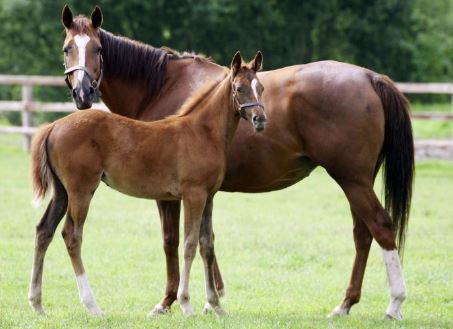Horse insurance, the world of horse ownership, is a realm of indescribable joy, camaraderie, and a unique bond between humans and these magnificent animals. However, along with the pleasures come certain risks and responsibilities inherent in caring for these graceful creatures. This is where horse insurance steps onto the scene – a safety net that both equestrian enthusiasts and their equine companions can rely on. In this all-encompassing article, we delve into the realm of horse insurance.

The Significance of Horse Insurance
Owning a horse is not just a hobby; it’s a commitment of time, energy, and finances. From boarding costs and training expenses to veterinary bills and participation in competitions, the financial outlay can be substantial. Furthermore, unexpected incidents like accidents, injuries, diseases, and even theft can swiftly turn this cherished journey into a daunting ordeal. This is where horse insurance plays a pivotal role – it extends a safety net that eases the financial strain stemming from these unforeseen circumstances.

Diverse Coverage Under Horse Insurance
- Mortality Insurance: This foundational form of horse insurance ensures that in the unfortunate event of a horse’s demise due to accidents, illnesses, or humane euthanasia, the financial value of the horse is compensated. Mortality insurance serves as a lifeline, helping owners recover financially from the loss.
- Major Medical and Surgical Insurance: Similar to humans, horses can undergo extensive medical treatments and surgeries. This facet of coverage assists in footing the veterinary bills associated with ailments, injuries, and necessary surgeries. A cornerstone of comprehensive horse insurance, this coverage guarantees top-notch medical care for your beloved equine without emptying your pockets.
- Loss of Use Insurance: If a horse becomes permanently incapable of fulfilling its intended functions (such as riding or competing) due to an accident or injury, loss of use insurance steps in to provide compensation. This recognition of the financial impact of losing a horse’s functionality and competitive potential is a vital component of horse insurance.
- Liability Insurance: Along with the joys of horse ownership come potential liabilities, including property damage or bodily harm caused by your horse. Liability insurance acts as a shield, covering legal expenses and potential settlements in case your horse causes harm to others or their property.
- Equine Care, Custody, and Control Liability: This form of coverage safeguards individuals who are responsible for horses that aren’t their own, such as those involved in boarding or training. It protects in case of injury, illness, or death of the horse under your care.
- Stallion Infertility Insurance: A crucial coverage for those engaged in horse breeding, this insurance compensates for financial losses in the event a stallion becomes infertile and cannot produce offspring.

Navigating the Horse Insurance Terrain
- Assess Your Requirements: Before securing horse insurance, carefully evaluate your horse’s age, breed, value, intended purposes, and any pre-existing conditions. This assessment will guide you in determining the suitable type and level of coverage.
- Identify Reputable Insurers: Seek out insurance companies with a track record in equine coverage. Delve into reviews, seek advice from fellow horse owners, and ascertain the company’s financial stability.
- Compare Policies Thoroughly: Different insurers offer varying coverage options and premium rates. Acquire quotes from multiple providers and meticulously compare their policies to guarantee the best value for your investment.
- Grasp Policy Details: Thoroughly review policy documents, including clauses, exclusions, deductibles, and coverage caps. A clear understanding of what’s covered and what’s not is essential.
- Leverage Agent Expertise: Agents specializing in equine coverage can provide invaluable insights. They can customize a policy to your unique needs and address any queries you may have.
- Maintain Precise Records: Keep detailed records of your horse’s health, medical history, and training regimen. Accurate documentation proves invaluable when submitting a claim.
- Regular Coverage Reviews: As your horse’s circumstances evolve, so do your insurance needs. Periodically assess your coverage to ensure it aligns with the current requirements.
Conclusion
Horse insurance isn’t just a safety net; it’s a commitment to the well-being of your cherished equine companion and your peace of mind as a devoted owner. From alleviating medical expenses to offering compensation in the face of unfortunate events, the diverse horse insurance policies cater to a spectrum of needs. By comprehending your horse’s demands, researching reputable insurers, and collaborating closely with experienced agents, you can procure the right coverage to protect both your treasured horse and the deep bond you share. Remember, the right insurance not only safeguards your horse but also preserves your passion and the extraordinary connection you nurture.
FAQs
1. What is horse insurance?
Horse insurance guards your animal from dangers such as sickness, harm, theft, or death, while also helping out if your horse leads to property issues or injuries. It steps in when things go wrong unexpectedly, offering support whether it’s medical costs or legal claims tied to your pet’s actions. Coverage varies, but most plans include vet bills, emergency care, and third-party incidents caused by the animal.
2. Why do horse owners need insurance?
Horses cost a lot to keep happy. So getting coverage means you’re set if your horse gets hurt or sick—no surprise costs piling up on you later.
3. What types of horse insurance are available?
People often pick mortality plans, big health coverage, surgery protection, liability policies, or loss-of-use deals for working horses.
4. How much does horse insurance cost?
Cost depends on how old the horse is, its breed, what it’s used for, health condition, also the kind of policy picked. Many people fork out a set amount every month or each year, depending on which option they go for.
5. How do I choose the right horse insurance policy?
Look at several insurance options, go over how much they cover, spot what’s not included, think about what your horse does day to day, then pick one that gives solid safety without costing too much.


